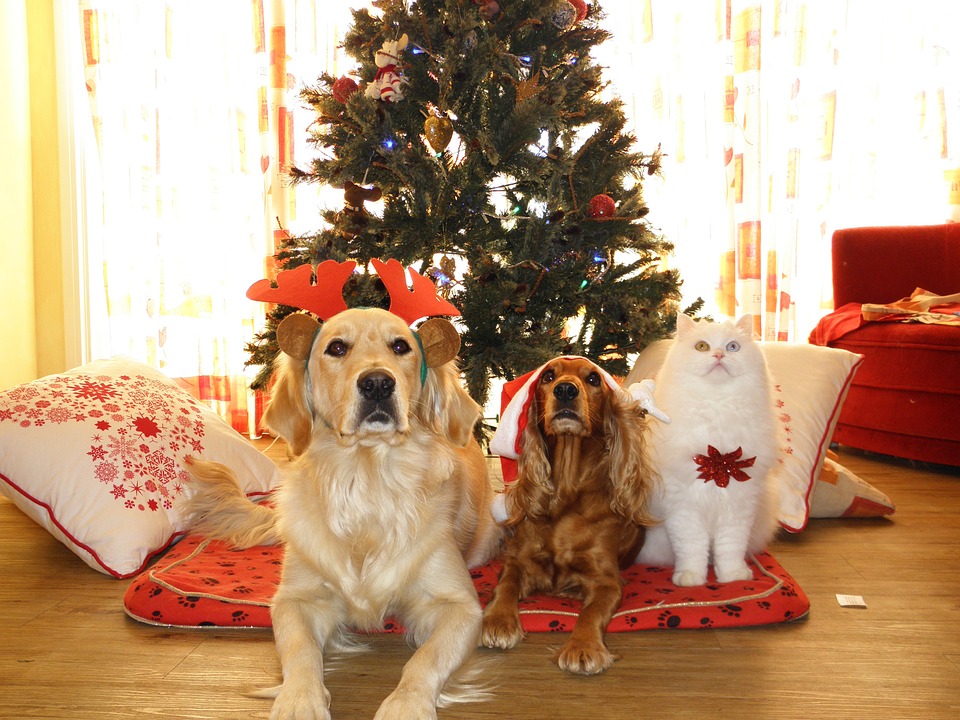
Christmas and New Year can be quite a dangerous time for our pets
Although we don’t always realise it, Christmas and New Year can be quite a dangerous time for our pets. The following information has been put together to give you festive pet care tips and advice on how to keep your pet fit and healthy during the season.
Stress and overexcitement
Dogs and cats get stressed and overexcited at Christmas, this can be due to a change of routine, lots of visitors, party poppers or New Year fireworks.
There are natural calming medications available to help keep them calm through the festive activities. These include Adaptil which gives off pheromones to help your pet feel more calm and helps them through stressful times. The Adaptil is plugged into the room where you pet spends most of their time, Feliway is a similar product for cats.
Valerian & scull cap also work well to reduce anxiety and are safe to use with other medications. Ask a veterinary nurse for more details on these products before deciding to use them.
Choking Hazards
During the Christmas period and right through to the New Year we see many cats and dogs that have munched their way through at least one of the following items:
- Christmas decorations
- Selection boxes
- Children’s toys
- Turkey and chicken bones
- Toxic houseplants, such as poinsettia & mistletoe
Poisoning Hazards
Taste is one of the main senses a pet will use to investigate an object, whether it be food or not. Puppies are particularly likely to chew and tear things with their teeth as a way of learning or out of boredom. The best ways to avoid your pet choking or swallowing something are as follows:
- Make sure meat carcasses are kept out of sight. They contain small bones that your pet may swallow and and choke on.
- Do not feed your pet grapes or raisins, they are poisonous to animals.
- Do not leave children’s toys lying around as they may have small parts that your pet could chew and choke on.
- Keep house plants out of your pets reach as many seasonal plants are toxic.
- Do not feed your pet chocolate, it is poisonous and deadly to animals.
- Keep tinsel, Christmas decorations, string, balloons and any sharp objects away from your pet as they can be dangerous if they are swallowed.
Chocolate!
The most common pet health problem at Christmas is chocolate. Theobromine, a substance found in chocolate and cocoa, is poisonous to animals and the results can be fatal.
Symptoms of chocolate can include vomiting, hyperactivity, hyperventilation, muscle tremors, shaking, dehydration, seizure and coma. If you witness your dog eating chocolate or suspect they may have, get them to a vet immediately – this is a life threatening situation.
Top tip – why not try giving your dog raw or cooked vegetables instead of chocolate or sweets as a healthy alternative. It’s also a great way to boost your dog’s immune system.
Fireworks
Firework fears are the most common cause of noise phobias which can be a problem during the New Year celebrations. This problem is more common in dogs but can also affect cats and rabbits.
Ensure you keep cats indoors during this time, as scared cats like to hide themselves away. The most difficult part of handling noise phobias in pets is that it is best not to reassure them, as this reinforces their fears. For further advice on noise phobias and festive pet care.
Follow this simple festive pet care advice guide, but most of all, don’t forget to enjoy having your pets at home this Christmas.
If your pet does indulge or you are concerned in any way over the Christmas or New Year period, remember Calder Vets has vets and nurses on site 24 hours a day, 365 days a year. Call us on 01924 465592.


News